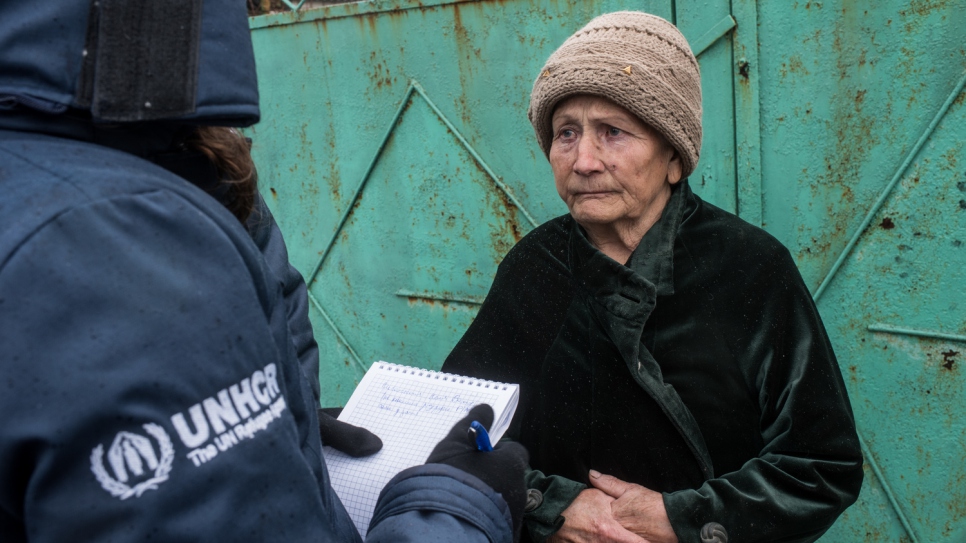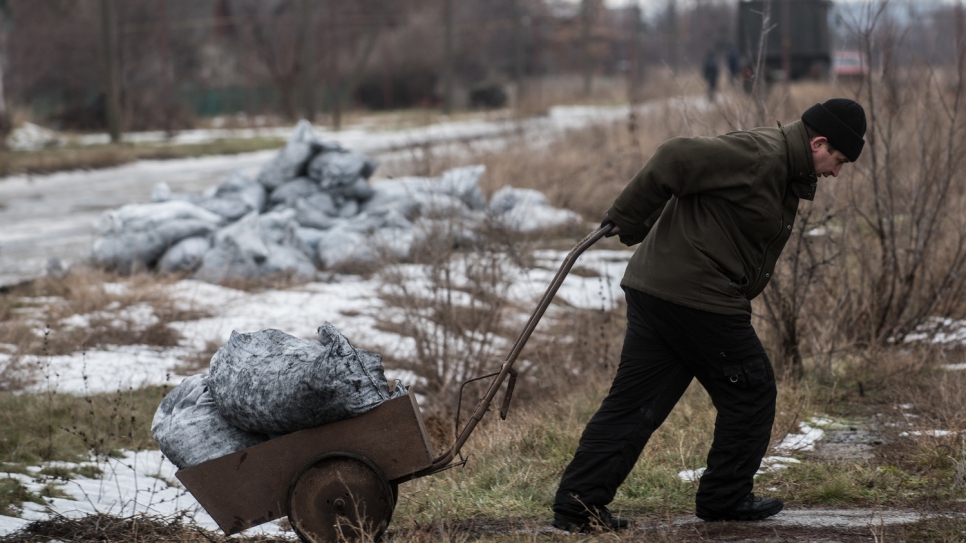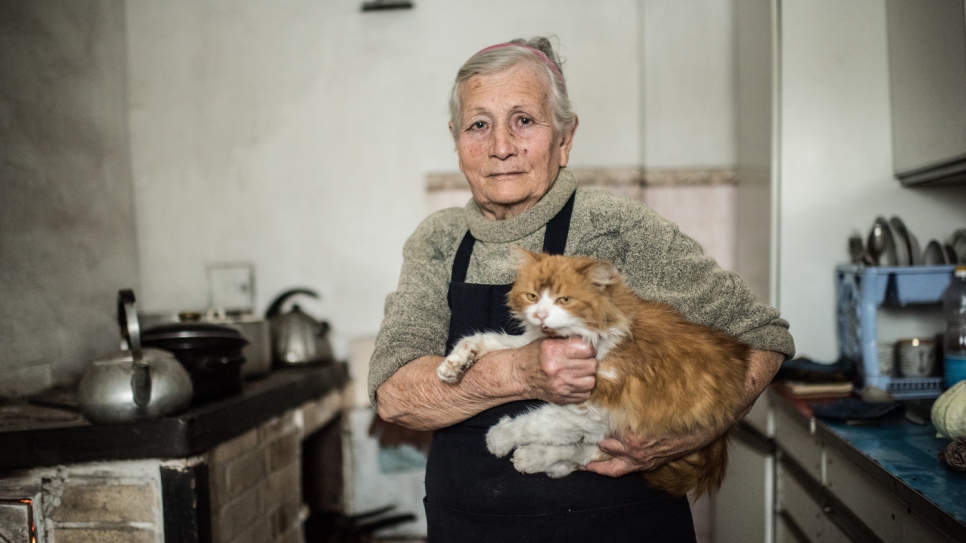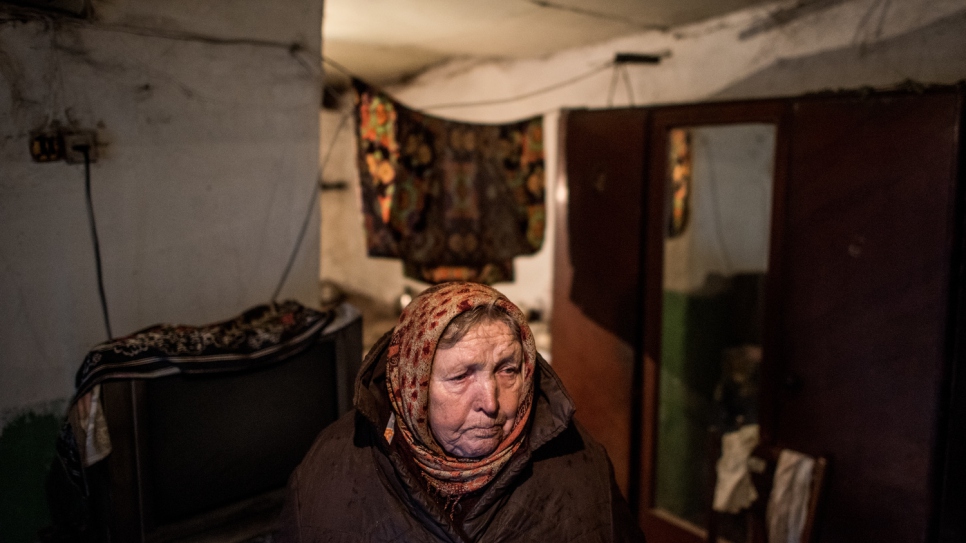Elderly bear brunt of hardship in front-line Ukraine village
A handful of older people who stayed behind struggle to keep warm in the harsh winter after conflict drove out younger residents.
Halyna, 79, signs the paperwork to receive a coal supply in the village of Luhanske, Donetsk.
© UNHCR/Evgeny Maloletka
The village of Luhanske, on the front line in eastern Ukraine, looks abandoned during the day. Only smoke from some of the chimneys shows that people still live there. Just a handful of elderly residents brave the shelling and the severe cold to call Luhanske their home.
Anna Tadyka, 68, showed us around the small kitchen where she spent the whole of last winter. “When it got freezing cold here, I sealed all the doors, put a mattress on the floor near the stove and burst into tears sitting on it,” she said.
As Ukraine enters the coldest months of January and February, with temperatures often falling below minus 20 degrees Celsius, winterization support for eastern Ukraine is not adequate to help vulnerable residents cope with the conditions caused by the conflict.
“I saved some money and bought coal,” Anna said. “It lasted me one month. But it was of bad quality. It’s like dust!” As she throws coal into the stove, a layer of black dust covers her face.
Anna cannot afford to heat every room in her big house, where she lives alone. Coal for the whole winter season costs about US $400. Her annual pension is less than US$600. Even if she managed to save more money to buy more coal, it would be difficult to have it delivered to a village on the front line. The road to Luhanske is damaged and hazardous, and coal distributors avoid the area.
Because of the shortage of fuel and money to pay for it, residents started gathering firewood on the outskirts of the village last summer.
“Because of fighting and the state of the roads, they do not have the basics to survive through this winter.”
Nadezhda Rudenok, 66, said they felled trees and spent the summer hauling them to the village. She bought one carload of firewood. “I had thought it wouldn’t last, but then we received some coal as humanitarian aid,” she said.
Gathering firewood is highly dangerous, since it often conceals unexploded ordnance which can explode if disturbed.
Resident Nina Zus took home some firewood from the field. She put it into the stove and when she cooked dinner, there was an explosion that injured her arm. Since then, she has not used firewood for fuel.
In early January, Nina received coal from the NGO Proliska, a local partner of the UN refugee agency UNHCR. Two hundred Luhanske residents will receive support under the scheme.
Pablo Mateu, UNHCR representative in Ukraine, said they were trying to reach people who had no money.
“Because of fighting and the state of the roads, they do not have the basics to survive through this winter,” he said. “There were many communities with people spending nights in the basement or living out in the cold.”
“In essence, ours is a street of old people. After the shelling, the young people left the village.”
It was difficult for humanitarian agencies to reach them because of the dynamics of the conflict, he added.
Since the heavy fighting in Luhanske in December, people are fearful of being caught up in the shelling when they are out of doors. When UNHCR’s coal truck reached the village, residents, who range in age from 50 to 80, helped each other to unload the coal sacks quickly.
Halyna Samokhvalova, 79, said she found living alone a challenge. Her daughter died 13 years ago and she has no any relatives with whom she could move in away from the conflict zone. She relies on her neighbour Victor, 64.
“In essence, ours is a street of old people,” said Victor. “After the shelling, the young people left the village.” He is one of the youngest people on the street and helps his more elderly neighbours get through the day.
“Every morning I ask Halyna if she needs anything, how she feels today. I can bring her some food, like sausage or bread.”
Victor said he twice helped her replace windows broken by the shelling. The windows of his own house were also damaged several times, but he decided to board them up.
“I will wait to repair them when the war ends,” he said.






